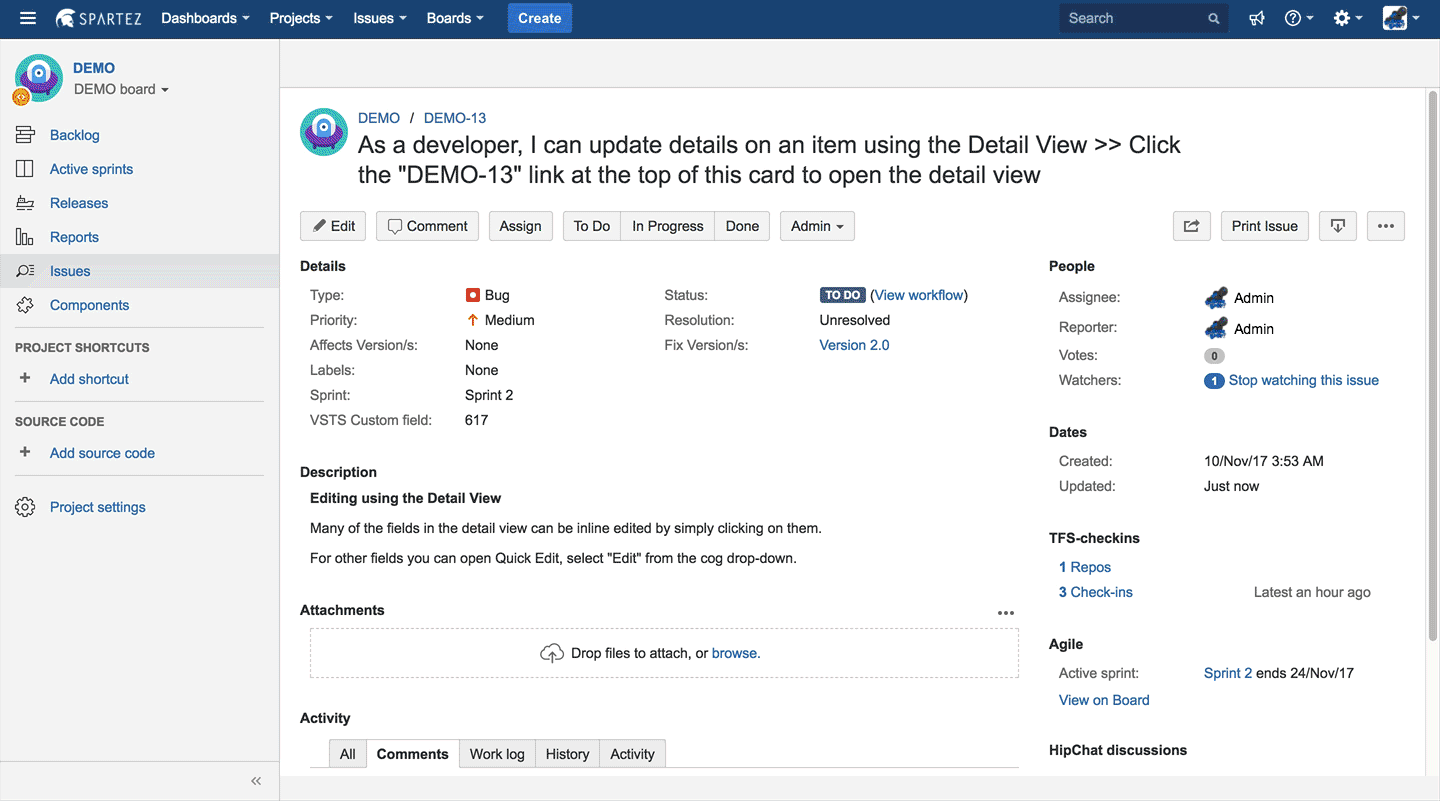Automatically Integrate Azure DevOps with Jira, ServiceNow, Zendesk, Github or any other trackers. The most complete and flexible synchronization tool. With the Exalate sync tool you can experience an intuitive collaboration between teams using Azure DevOps and any of our other supported trackers by synchronizing issue data automatically across. You can try Jira to Azure DevOps Integration, Synchronization & Migration Tool - TFS4Jira or Team Services Git Integration for JIRA as these are free trials. Want to become Azure Developer, check out this Microsoft Azure Training. Integrating Azure and Jira with TFS4Jira plugin will save you time and budget. With our simplified installer, you can effortlessly integrate and synchronize changes made to the issues and work items between Jira and TFS / Azure DevOps platforms. New issues/work items. THE COMPLETE AZURE DEVOPS TO JIRA INTEGRATION GUIDE Teams are generally looking to set up an integration between Jira and Azure DevOps to have the freedom to set up their own platforms however they want. All the while streamlining efficiency in collaboration efforts across these systems.
We pit the two most powerful and equally popular project management tools – Azure DevOps and Jira – against each other to see which one’s better than the other. Both are incredibly versatile tools well-suited for visualizing and monitoring the scope of a project in order to effectively manage projects and tasks at hand, and to take a glance of whether your team is on the right track. Let’s take a look at some key differences between the two.
What is Jira?
Jira is a project management tool developed by Australian company Atlassian for bug tracking, issue tracking and other project management processes. It is primarily an issue tracking and project management system which comes in different flavors, such as JIRA Core, JIRA Software, and JIRA Service Desk, each one cater to the needs of all kinds of users. It started out as a simple bug-tracking tool, but has grown over the years to become an all-purpose issue tracking solution. Today, Jira is more than just an application – it has become a platform with a suite of other products that are built on top of it and its numerous customization capabilities turn it into a different system altogether. Customers can choose the product best suited to their needs, whether they are running an Agile software development project or a generic task management system or a customer help desk portal. JIRA Software is well suited for software development teams that want to use Agile methodologies, such as Scrum.
What is Azure DevOps?
Azure DevOps is the Microsoft’s own set of cloud hosted DevOps services and collaboration tools that work for any language targeting any platform. It has everything you need to turn your idea into a working piece of software – you can plan your project with Agile tools, you can manage your test plans from the web, version your code using Git, and deploy your solutions to an incredible cross-platform CI/CD system. Unless you’re an organization with more than five developers or you make more than a million dollars in yearly revenue, this product is free to use. Formerly called Visual Studio Team Services (VSTS), Azure DevOps is a tool provided by Microsoft Azure to implement a DevOps lifecycle in a business. Azure DevOps makes integrating DevOps with Azure much easier by covering the entire software lifecycle. It is basically a set of modern services used to collaborate better on an entire software development lifecycle.
Difference between Azure DevOps and Jira
Basics
– Both Azure DevOps and Jira are the two leading application lifecycle management (ALM) systems that help organizations better manage their application lifecycle right from the very beginning, from planning, collaboration until testing and deployment. Jira is a project management tool developed by Atlassian for software development teams. Azure DevOps is a tool provided by Microsoft Azure to implement a DevOps lifecycle in a business. It was formerly known as Visual Studio Team Services (VSTS) but has been rebranded as Azure DevOps.
Pricing
– Microsoft offers a free trial for its DevOps packages so that users could test run the products on premise free of charge. It is absolutely free for up to 5 users while the paid services start at $6 per user per month or $30 per month for up to 10 users. A standard user should be fine with a free license. For larger teams, you can go up to 1,000 users for $6,150 per month. The portfolio of Jira tool costs a flat fee of $10 per month for up to 10 users and for teams of over 11 but less than 100, it will cost $7 per user per month.

Agile Support
– Jira Software is well-suited for software development teams that want to use Agile methodologies, such as Scrum and Kanban, and any framework in between. It is an Agile project management tool out-of-the-box to help manage your Agile software development projects from a single tool, from agile boards to reports. Unlike Azure DevOps, Jira gives users the power to iterate their workflows and then progressively add more features as they go. Azure DevOps is a tool provided by Microsoft Azure to implement a DevOps lifecycle in a business.
Traceability
– When working with Jira, it is possible to relate commits, pull requests and other changes in GitHub back to work described in Jira. But you cannot see whether a completed user story is associated with a release already. There will be no direct visibility on which work item was completed with which deployment. This is different when working with Azure Boards, Repos and Pipelines. When using Azure DevOps services, traceability is possible from start to deployment, and the other way around.
Search Capabilities
– Jira Software comes with advanced search capabilities that will allow you to find issues quickly and take action. You can easily search all the bugs of a particular project using JQL (Jira Query Language). You can also search for issues quickly by simply using text. You can search for a single term or phrase using the text search. There is also an amazing feature in Jira allows not only to save your searches but also receive the results via email. Azure DevOps, on the other hand, does not have such advanced search capabilities like Jira.
Azure DevOps vs. Jira: Comparison Chart
Summary
Azure DevOps is a project management tool by Microsoft which accelerates the building, testing and deployment of applications by bringing the developers team and the operations team together for a smooth and seamless software delivery. It has everything you need to turn your idea into a working piece of software. JIRA Software is well suited for software development teams that want to use Agile methodologies, such as Scrum. Jira is primarily an issue tracking and project management system, while Azure DevOps covers the entire software development lifecycle.
- Difference Between IPS and VA - December 10, 2020
- Difference Between IPS and TN - December 9, 2020
- Difference Between Hedge Fund and Asset Management - December 8, 2020
Teams are generally looking to set up an integration between Jira and Azure DevOps to have the freedom to set up their own platforms however they want. All the while streamlining efficiency in collaboration efforts across these systems.
Integrate Azure Devops With Jira Tutorial
When integrated correctly, teams will not need to worry about their security or autonomy being lost in the process.
In this guide, we’ll discuss:
- the rising need to integrate Azure DevOps with Jira and why admins set up this integration in the first place.
- how to choose the right technology to configure the integration.
- the step-by-step process on how to set up the integration.
- security and architecture of integration solutions

Who is this guide for?
Integrate Azure Devops With Jira
- IT professionals managing (or involved in) cross-company integration projects...
- PMO professionals in an IT organization or department...
- Professionals managing support or development teams...
- Teams using disconnected technology...
- Members of the operations teams in an IT organization or department...